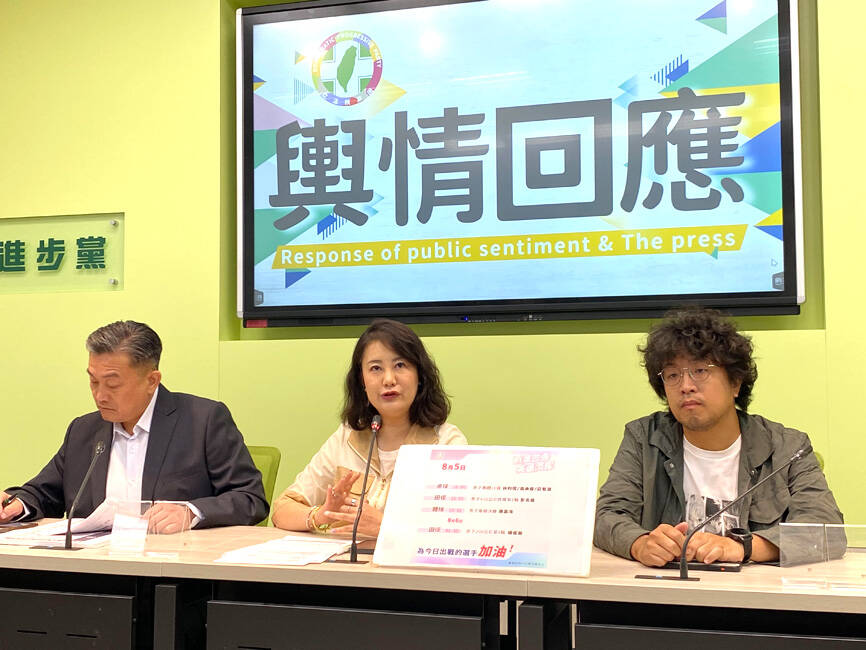The Democratic Progressive Party (DPP) caucus yesterday slammed former president Ma Ying-jeou’s (馬英九) comments that the government was squandering money on national defense, saying he has embarrassed himself by ignoring China’s rapidly expanding armed forces and military threat against Taiwan.
During a speech on Sunday at an event in Bangkok, Ma said the government had taken on a heavy burden by allocating large sums of money for military expenditure, notably to buy US-made weapons, as payment for “protection,” as former US president Donald Trump has said.
“Money-pit bills” to buy arms would ruin public finances and only benefit the US defense industry, he said.

Photo: Hsieh Chun-lin, Taipei Times
At a news conference in Taipei yesterday, DPP caucus secretary-general Rosalia Wu (吳思瑤) said that “portions of the government’s fiscal budget are for military spending to protect our country.”
“We actively engage in arms procurement from other countries to bolster our national defense, as well as to support indigenous weapons production,” she said.
“So what is wrong with building up national defense to safeguard our own country? Many countries around the world have higher military budgets than Taiwan? Are all their defense expenditures ‘money pits’?” she asked.
Ma has embarrassed himself on the world stage by calling military spending as squandering money, DPP Legislator Wang Ting-yu (王定宇) said.
“During Ma’s eight years as president, the government budget for national defense totaled more than NT$300 billion [US$9.19 billion at the current exchange rate]. It was not much, but he did allocate a budget,” Wang said.
China in March approved a national defense budget of more than 1.665 trillion yuan (US$234.35 billion), a 7.2 percent increase from last year, Wang added.
“We are the one under hostile intimidation by China, but Ma says Taiwan spending on the military is squandering money. Ma chooses to grovel and kowtow to China, while Beijing expands its budget to escalate its military threat against Taiwan,” he said.
Taiwan People’s Party Legislator Lin Yi-chun (林憶君) yesterday also criticized Ma’s comments.
“Allocating a budget for national defense depends on the military threat against Taiwan, and the amount should be adjusted as needed,” she said.
Taiwan faces more intense hostility from China compared with when Ma was in office, she said.
“Taiwan must invest in national defense, which has nothing to do with Trump’s talk about ‘paying for protection,’ nor Ma’s talk of ‘money-pit bills.’ It is necessary to allocate a budget to build up a more effective deterrent against hostile military threats from abroad,” she said.
The government must carefully plan the national defense budget to enhance Taiwan’s deterrence, while engaging in dialogue with China to reduce hostilities. This is the best way for Taiwan to achieve long-term peace and security,” Lin said.
Additional reporting by Lin Che-yuan

An essay competition jointly organized by a local writing society and a publisher affiliated with the Chinese Communist Party (CCP) might have contravened the Act Governing Relations Between the People of the Taiwan Area and the Mainland Area (臺灣地區與大陸地區人民關係條例), the Mainland Affairs Council (MAC) said on Thursday. “In this case, the partner organization is clearly an agency under the CCP’s Fujian Provincial Committee,” MAC Deputy Minister and spokesperson Liang Wen-chieh (梁文傑) said at a news briefing in Taipei. “It also involves bringing Taiwanese students to China with all-expenses-paid arrangements to attend award ceremonies and camps,” Liang said. Those two “characteristics” are typically sufficient

A magnitude 5.9 earthquake that struck about 33km off the coast of Hualien City was the "main shock" in a series of quakes in the area, with aftershocks expected over the next three days, the Central Weather Administration (CWA) said yesterday. Prior to the magnitude 5.9 quake shaking most of Taiwan at 6:53pm yesterday, six other earthquakes stronger than a magnitude of 4, starting with a magnitude 5.5 quake at 6:09pm, occurred in the area. CWA Seismological Center Director Wu Chien-fu (吳健富) confirmed that the quakes were all part of the same series and that the magnitude 5.5 temblor was

The brilliant blue waters, thick foliage and bucolic atmosphere on this seemingly idyllic archipelago deep in the Pacific Ocean belie the key role it now plays in a titanic geopolitical struggle. Palau is again on the front line as China, and the US and its allies prepare their forces in an intensifying contest for control over the Asia-Pacific region. The democratic nation of just 17,000 people hosts US-controlled airstrips and soon-to-be-completed radar installations that the US military describes as “critical” to monitoring vast swathes of water and airspace. It is also a key piece of the second island chain, a string of

The Central Weather Administration has issued a heat alert for southeastern Taiwan, warning of temperatures as high as 36°C today, while alerting some coastal areas of strong winds later in the day. Kaohsiung’s Neimen District (內門) and Pingtung County’s Neipu Township (內埔) are under an orange heat alert, which warns of temperatures as high as 36°C for three consecutive days, the CWA said, citing southwest winds. The heat would also extend to Tainan’s Nansi (楠西) and Yujing (玉井) districts, as well as Pingtung’s Gaoshu (高樹), Yanpu (鹽埔) and Majia (瑪家) townships, it said, forecasting highs of up to 36°C in those areas